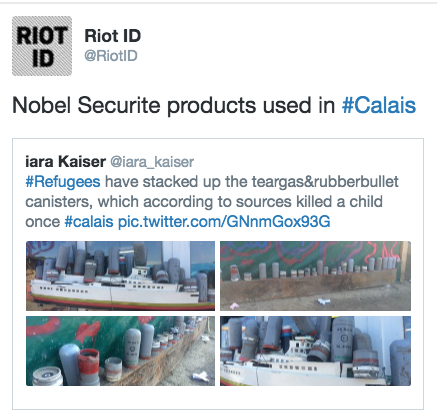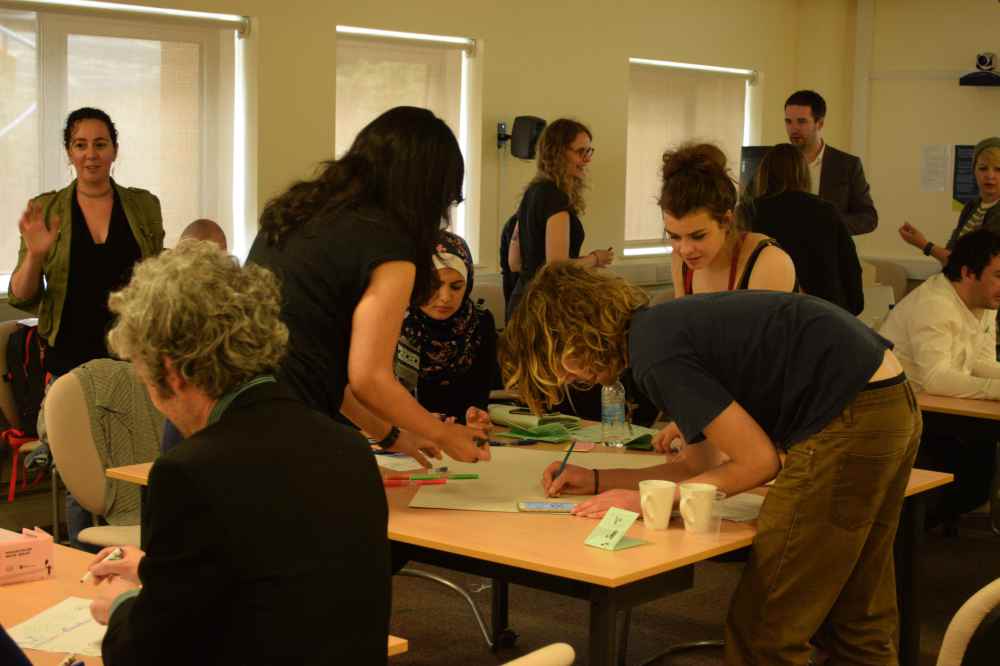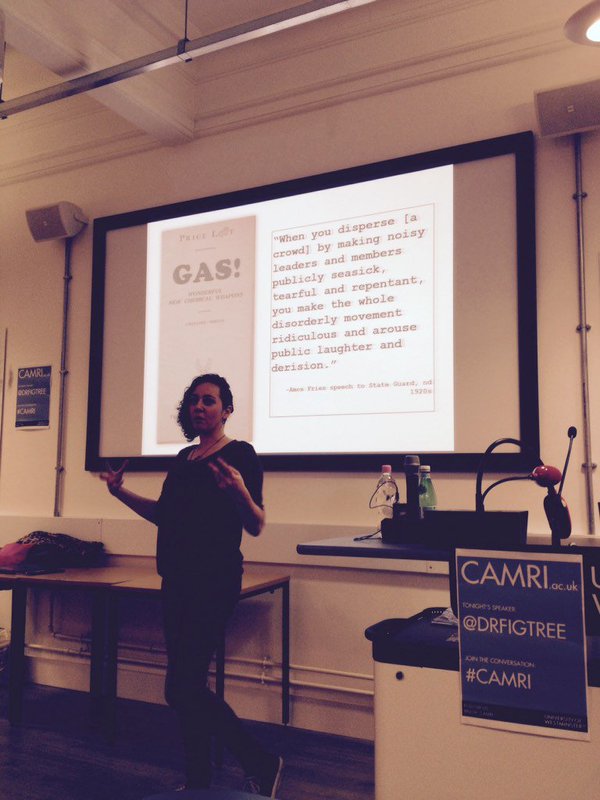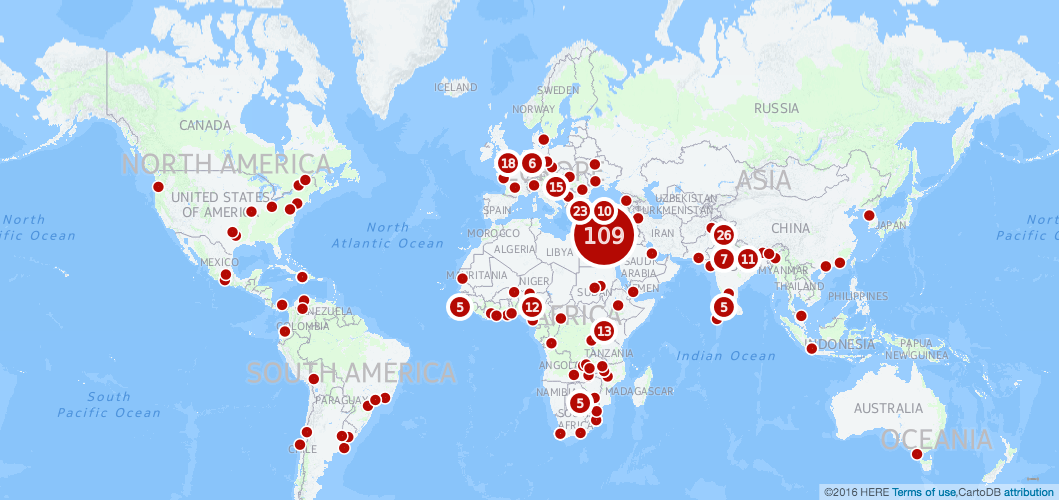 Our French samples of CS gas would leave our audience feeling sick, so for now we stick to power points when our tear gas research hits the road. Since the new year, members of Bournemouth University’s Civic Media team have had the opportunity to travel all around the country giving talks and workshops at UK Universities. Our Tear Gas project brings together academics, NGOs and digital designers to respond to the need for more publicly accessible information regarding tear gases’ effects on human life, animals and environments. We also consult and advise with organisation’s like Amnesty International on the policies and practices associated with the tear gas trade to help support human rights work around the world.
Our French samples of CS gas would leave our audience feeling sick, so for now we stick to power points when our tear gas research hits the road. Since the new year, members of Bournemouth University’s Civic Media team have had the opportunity to travel all around the country giving talks and workshops at UK Universities. Our Tear Gas project brings together academics, NGOs and digital designers to respond to the need for more publicly accessible information regarding tear gases’ effects on human life, animals and environments. We also consult and advise with organisation’s like Amnesty International on the policies and practices associated with the tear gas trade to help support human rights work around the world.
In February project lead Dr. Feigenbaum was invited to talk at the University of York as part of their Social and Political Sciences speaker series. Then it was over to the University of Sussex in early March, sharing two of our Fusion Funded BU Datalabs projects on Mapping Tear Gas and RiotIDs. Later in March, Dr. Feigenbaum headed into London for an invited talk on ‘Tear Gas and Other Media‘ at the University of Westminster. Then the whole team went up North in April for a RiotID workshop hosted by the University of Sheffield‘s Crick Centre as part of an ESRC Seminar Series. Postgraduate students and Senior Research Assistants Oz Demirkol and Daniel Weissmann, as well as URA Laura McKenna helped deliver a co-creation workshop alongside industry graphic design partner Minute Works and our NGO partner Omega Research Foundation.
To explore the innovative methodology our project employs, combining investigative and data journalism practices, in early May we teamed up with Kings College London‘s new Centre for Digital Culture to host a two-day investigative research workshop, bringing together academics, NGOs and journalist from around Europe. The event was co-sponsored by both MeCCSA Social Movement Network and the Political Science Association, as well as by our research groups at BU. Later that month we were back on the train headed for Keele University’s Media Environments workshop in May. Dr. Feigenbaum and Minute Works co-designed an interactive workshop using our Fusion model for how to turn research into information visualisations for making impact.
Then it was back to London in June for a double header of events on security and arms control at the University College London. First up was a paper presentation on the Wellcome Trust funded part of our research lookin g at the Communication of Medical Knowledge in Tear Gas History. This two day interdisciplinary and international event was hosted aat UCL’s Global Governance Institute. A symposium directly followed on History, Security and Arms Control that marked the end of Professor Brian Balmer’s AHRC project on the Biological Weapons Convention. Speaking to an audience of 50 academics, policy-makers and NGOs, Dr. Feigenbaum presented on ‘Communication Approaches to the History of Tear Gas’, highlighting how policy-based research can engage with new digital technologies, information design and digital storytelling to make meaningful interventions in arms control.
g at the Communication of Medical Knowledge in Tear Gas History. This two day interdisciplinary and international event was hosted aat UCL’s Global Governance Institute. A symposium directly followed on History, Security and Arms Control that marked the end of Professor Brian Balmer’s AHRC project on the Biological Weapons Convention. Speaking to an audience of 50 academics, policy-makers and NGOs, Dr. Feigenbaum presented on ‘Communication Approaches to the History of Tear Gas’, highlighting how policy-based research can engage with new digital technologies, information design and digital storytelling to make meaningful interventions in arms control.
Up next, in July Dr. Feigenbaum and summer URA Lauren Weeks are heading to the International Association of Media and Communication‘s annual conference to present their paper on the project’s use of social media in addressing issues of policing and human rights. Then it’s time for a holiday!
Our Tear Gas project has brought Bournemouth University’s Fusion vision to universities around the country. This work grew out of two fusion-funded grant projects. It has benefited from Fusion’s cross-faculty collaborations, partner networking opportunities, and working with four URA students over the course of its three years. The fruits of this collaborative labour can be seen in the steady stream of invitations we receive to take our cross-partner, co-creation project on tour–sharing and inspiring about issues that matter.












 Expand Your Impact: Collaboration and Networking Workshops for Researchers
Expand Your Impact: Collaboration and Networking Workshops for Researchers Visiting Prof. Sujan Marahatta presenting at BU
Visiting Prof. Sujan Marahatta presenting at BU 3C Event: Research Culture, Community & Can you Guess Who? Thursday 26 March 1-2pm
3C Event: Research Culture, Community & Can you Guess Who? Thursday 26 March 1-2pm UKCGE Recognised Research Supervision Programme: Deadline Approaching
UKCGE Recognised Research Supervision Programme: Deadline Approaching ECR Funding Open Call: Research Culture & Community Grant – Apply now
ECR Funding Open Call: Research Culture & Community Grant – Apply now ECR Funding Open Call: Research Culture & Community Grant – Application Deadline Friday 12 December
ECR Funding Open Call: Research Culture & Community Grant – Application Deadline Friday 12 December MSCA Postdoctoral Fellowships 2025 Call
MSCA Postdoctoral Fellowships 2025 Call ERC Advanced Grant 2025 Webinar
ERC Advanced Grant 2025 Webinar Update on UKRO services
Update on UKRO services European research project exploring use of ‘virtual twins’ to better manage metabolic associated fatty liver disease
European research project exploring use of ‘virtual twins’ to better manage metabolic associated fatty liver disease